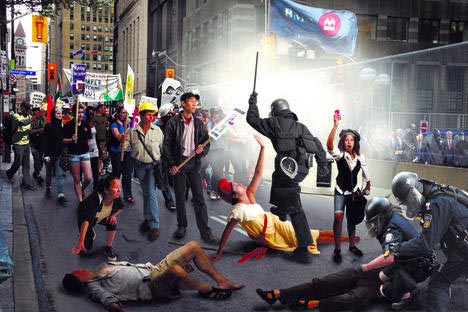Portrait of Resistance, directed by Roz Owen and produced and edited by Jim Miller, is an intimate documentary on Toronto artists Carol Conde and Karl Beveridge which premiered at the Planet in Focus Film Festival in Toronto on Oct. 13.
The film explores the life and work of the two artists whose marriage and artistic collaboration has lasted four decades. They are a quintessential Toronto love story: minimalist sculptors who met in 1960s Yorkville, competed for gallery space and grants, and crafted a career in activist art.
Starting their careers at the point that Beveridge terms “the end of modernism,” they commenced a lifelong experiment in purposeful art. First they were the subjects in their own photographic artistic installations typical of the “revolutionary” art of the ’60s and ’70s. Their installations often relied heavily on text, one of them reading: “art must be responsible for its politics.” Conde and Beveridge have, throughout their careers and relationship, walked that talk.
In their 40-year collaboration, they have certainly never had any interest in apolitical art, or art for art’s sake. The film finds them currently making the photographic equivalent of “tableaux vivants” with a definite, unambiguous viewpoint. The political is never in the subtext, it’s in your face. It is an almost archaic today to be so didactic in art. But it works. And so do they. They have made successful careers producing art for political causes, the Labour Movement, and the environment.
One of their recent works, Liberty Lost (Toronto G20), is a reworking of “Liberty on the Barricades” set in the Toronto G20 rather than the French July Revolution, and will be very familiar to rabble.ca readers as the it was used on the cover of rabble’s Best of 2010 almanac. It is a rendering of the classic Delacroix canvas with Toronto as the backdrop.
Conde and Beveridge also recreated a classic Bruegel canvas as a depiction of the politics and semiotics around the struggle against the privatization of the water resources in Cochabamba, Colombia. The photographs used to replicate these classics are unapologetically staged and use actors as subjects, much as painters once did. These artists are unafraid to co-opt or pay homage to any artistic convention to make a point.
Other subjects of their work has the Nanticoke coal-fired generating plant, the creeping privatization of medicine in Canada, and the plight of migrant workers. They have also documented numerous labour struggles using photography the way labour troubadours once used song.
Beveridge and Conde are working artists of undiminished idealism. They have been making political photographic narratives for four decades and would rather be doing nothing else. Owen captures their relationship beautifully, often interviewing them on their own bed. The filmmaking is honest and unobtrusive. The subtle camera work captures perfectly two people who love each other and have spent a lifetime living a struggle they love.
Portrait of Resistance does take an occasional turn into the post modern. In one of the final scenes, characters in a apparent photograph come to life to pronounce on the artistic merits of Conde and Beveridge’s oeuvre. Even though it is a new tack late in the film, it still works. This is a documentary about art, not photography, and art is not limited by conventions, filmic or otherwise.
Portrait of Resistance is an inspiring film as much for its elegant execution, as for its subtext that lives lived for art, love, and revolution can be so fulfilling, and so normal.
Humberto DaSilva is a regular contributor to Not Rex Murphy on rabbletv.



